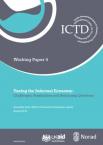ICTD Working Paper 22
This paper investigates the relationship between tax structures and economic growth in a panel of developed and developing countries. In order to raise revenue, low-income countries have historically relied more heavily on international trade taxes, whilst richer nations employ comparatively more consumption and income taxes. Using the new Government Revenue Dataset (GRD) from the International Centre for Tax and Development (ICTD), we consider the effects of revenue-neutral changes in tax structure on economic growth for a panel of over 100 countries with data covering the period 1980-2010. Results from the Common Correlated Effects Mean Group (CMG) estimator (Pesaran 2006) find that increases in income taxes (specifically personal income taxes) offset by reductions in trade or consumption taxes have had a negative impact on GDP growth rates. We also highlight the fact that trade liberalisation has not had any discernible positive effects on economic growth. Revenue-neutral increases in personal income taxes are found to be particularly harmful in middle- and low-income countries. Taken alongside the results of, for example, Baunsgaard and Keen (2010), this is a reminder of the difficulties of tax reform for developing countries.
